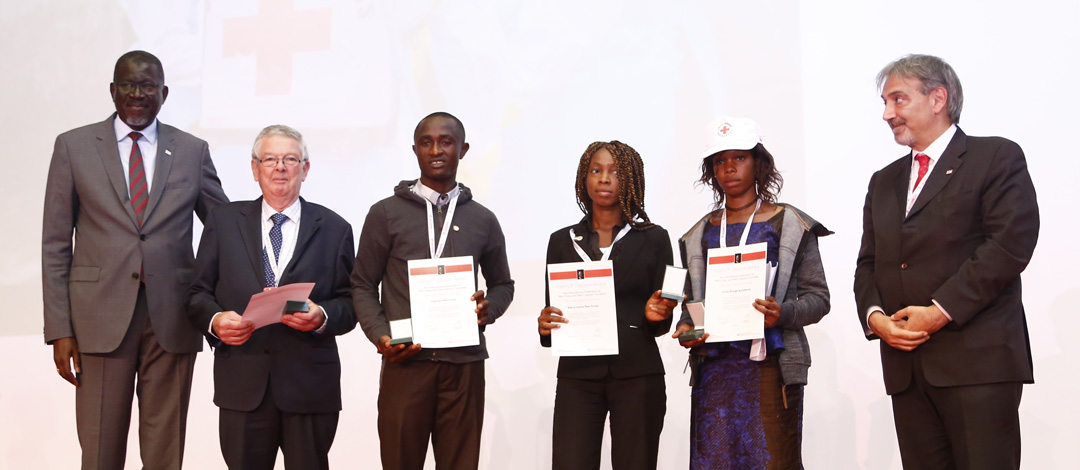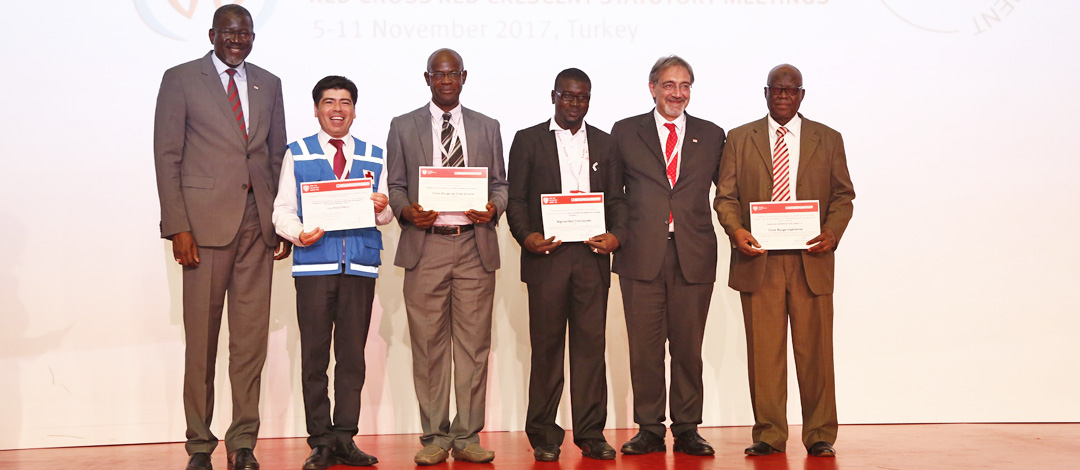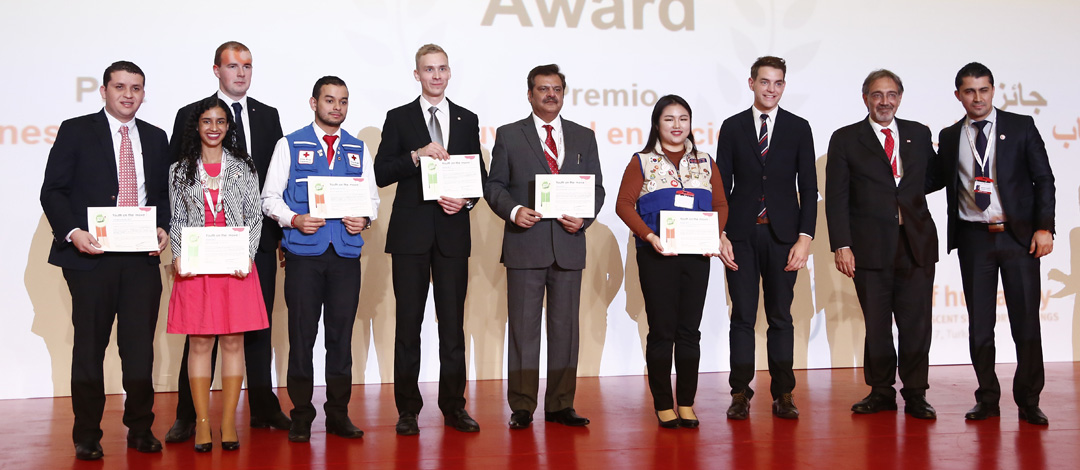Honouring our humanitarian heroes
National Societies and their individual staff and volunteers were honoured for their outstanding contribution to humanity at a special ceremony on 9 November.
The Henry Dunant Medal – the highest distinction that the Movement can bestow on an individual – was awarded to Professor Michael Bothe of the German Red Cross and Mr Arthur Agany Poole of the South Sudan Red Cross.
Standing Commission Chair Mr George Weber praised Professor Bothe, a leading figure in International Humanitarian Law who has long been associated with the Movement, for his “exceptional commitment to strengthening IHL and promoting the Fundamental Principles”.
Introducing Dunant Medal winner Mr Arthur Agany Poole, Mr Weber told delegates how “Uncle Arthur” had volunteered for the Sudanese Red Crescent and later the South Sudan Red Cross between the 1950s and his retirement in 2014. “He embodies the humanitarian spirit and is an inspiration.”
IFRC bestowed its highest honour – the Henry Davison medal – on Ms Lopou Toupou of Guinea, Mr James Mawolo Kpardeh of Liberia and Ms Augusta Kumba Charles of Sierra Leone in recognition of the life-saving work carried out by volunteers during the Ebola crisis; the volunteers of the Turkish Red Crescent Society for their tireless work supporting refugees, and Mr Jerry Talbot of New Zealand for his decades of achievement with IFRC and the New Zealand Red Cross.
FULL LIST OF WINNERS
Youth on the Move Awards –
Healthy Youth Make a Healthy World
Winner: Nicaragua Red Cross, Runner-up: Tajikistan Red Crescent Society
Strengthening Resilient Communities
Winner: New Zealand Red Cross, Runner-up: Brazil Red Cross
Promoting Social Inclusion and a Culture of Non-Violence and Peace
Winner: Colombia Red Cross, Runner-up: Finnish Red Cross
Use of Technology and Innovation
Winner: Republic of Korea National Red Cross, Runner-up: Pakistan Red Crescent Society
Volunteering and Development Awards –
Use of Innovation in mobilising and managing volunteers
Winner: Côte d’Ivoire Red Cross and Nigeria Red Cross
Volunteer management in urban environments
Winner: Niger Red Cross
Volunteer mobilization and management in emergencies, fragile environments and crises
Winner: Chilean Red Cross
Florence Nightingale Medal
In 2017, 39 nurses from 22 countries were awarded the Florence Nightingale Medal. The awardees were nominated by their respective National Red Cross or Red Crescent Society and selected by a commission comprised of the ICRC, IFRC, and the International Council of Nurses.
Henry Davison Medal
Ms Lopou Toupou, Guinea
Mr James Mawolo Kpardeh, Liberia
Ms Augusta Kumba Charles, Sierra Leone
The volunteers of the Turkish Red Crescent Society
Mr Jeremy Talbot, New Zealand
Henry Dunant Medal
Professor Michael Bothe of the German Red Cross.
Mr Arthur Agany Poole of the South Sudan Red Cross.
Deep Blue computer launches RC² Forum
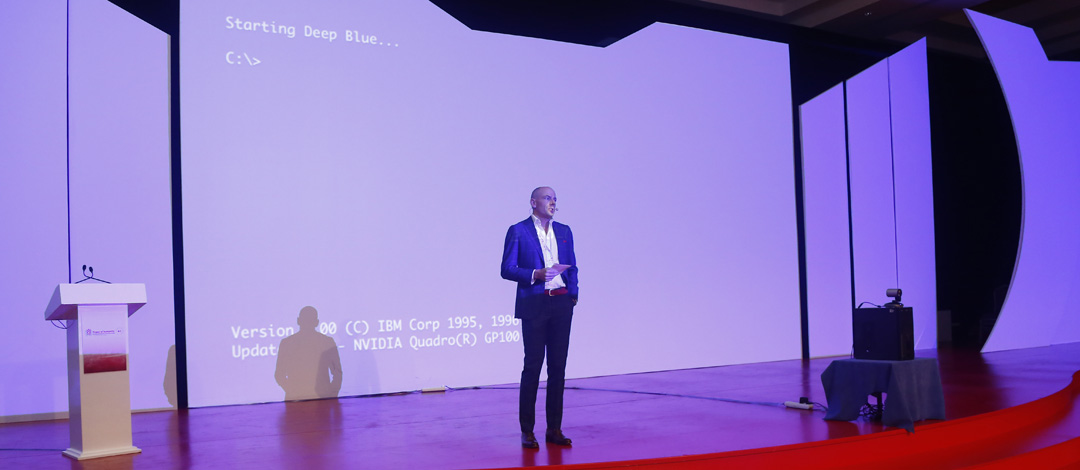
An artistic performance, “Deep Blue Dream_deeper”, opened the RC² Forum, showcasing the power and potential of artificial intelligence.
It was an appropriate curtain-raiser for an event that set out to explore future trends and their impact on people and humanitarian action.
Speaking at the RC² Forum’s opening, Christoph von Toggenburg, head of social engagement at the World Economic Forum, said: “I want you to think about this day as an opportunity, but also a festival, that gives you the flexibility to learn about new topics and new ideas, and help to shape a future agenda.”
Themes covered during the RC² Forum included increasing social fragmentation, the rise of extremism, the decrease of trust in institutions, demographic shifts and funding challenges.
These areas of concern were identified during a series of six engagement sessions around the world, curated by IFRC and the ICRC, in which 78 National Societies participated.
Migration: National Societies welcome a new Strategy and Road Map
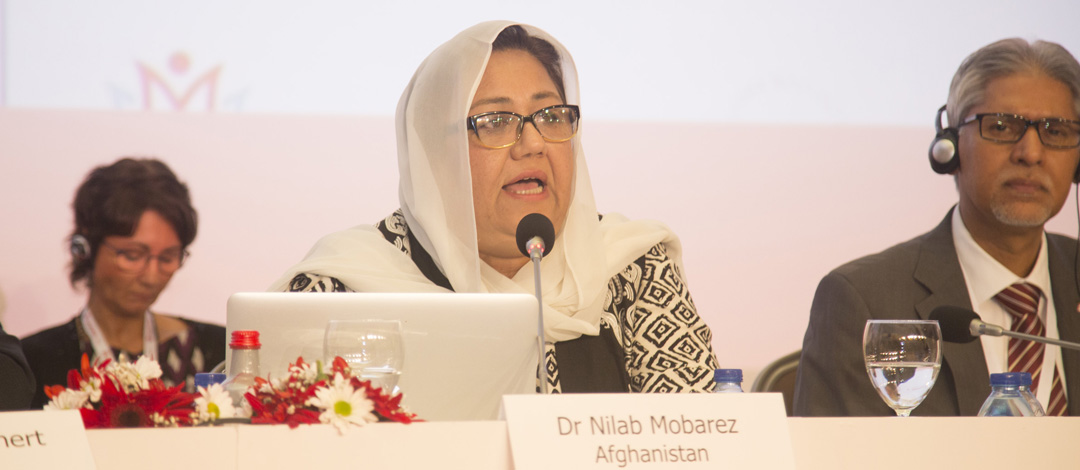
A new Strategy and Road Map on migration was endorsed to a loud round of applause at the General Assembly on 8 November, as National Societies and IFRC welcomed a new direction to our collective response to a complex crisis.
“National Societies have been extending support to the people on the move for decades,” said Jagan Chapagain, IFRC Under Secretary General for Programmes and Operations, told the Plenary.
“In 2017 alone, we have provided assistance and protection to some 9.2 million people, including internally displaced, migrants, refugees and host communities through a variety of emergency and long-term interventions in all regions of the world.”
IFRC’s Global Strategy on Migration will guide the network until the end of 2022 under the title “Reducing Vulnerability, Enhancing Resilience”. It recognises that the migration issue goes beyond meeting humanitarian needs and mitigating risk, and must also build the resilience of migrants and host communities by integrating assistance, protection and advocacy.
The accompanying Road Map is designed to guide a transition towards more consistent and mainstreamed migration strategies across the network, and sets out the collective investments IFRC must make to achieve the strategy’s goals.
Before the Assembly endorsed the strategy and road map, the issues were debated in Plenary by a panel discussion featuring the expertise of Raphael Berrecil Diaz of Mexican Red Cross, Dr Nilab Mobarez of Afghanistan Red Crescent, Prof. Moamena Kemal of Egyptian Red Crescent and Dr Johannes Richert of German Red Cross.
Watch the new video on IFRC’s migration work and strategy:
New volunteer charter to protect lifeblood of the Movement
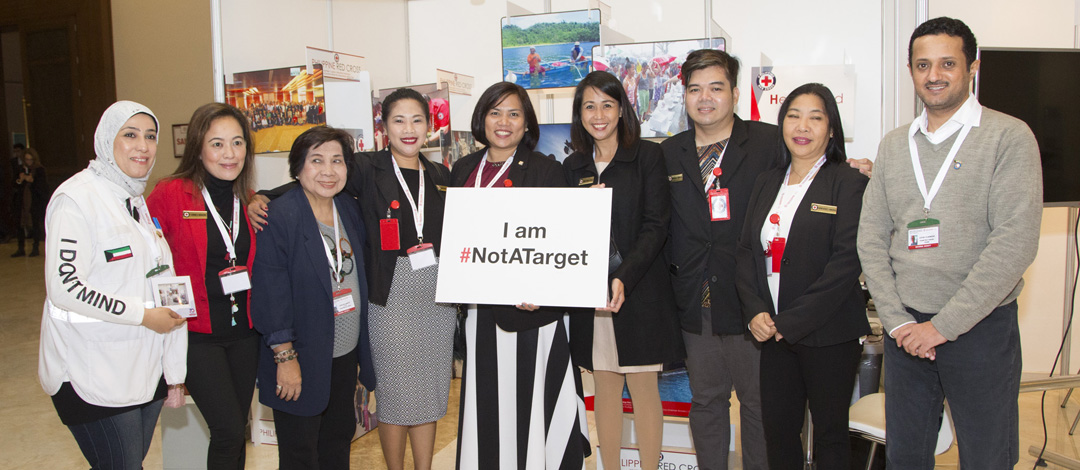
“Without our volunteers, we would simply not exist.” This was the strong message that accompanied the enthusiastic endorsement of a new Volunteer Charter by the General Assembly on 8 November.
IFRC Under Secretary General Dr Jemilah Mahmood moderated a panel discussion on volunteering, which featured Ms Frehiwot Worku of Ethiopian Red Cross, D. Javier Senet Garcia of Spanish Red Cross, Pearl Li of Australian Red Cross, and external expert Mr Paul Currion.
Following the panel, National Societies spoke of the fundamental importance of recruiting, resourcing, training, protecting and retaining volunteers. They also discussed issues such as the changing patterns of volunteering, future trends, and the importance of trying new approaches to volunteering within the IFRC network.
“We have not only to recruit volunteers, but empower them and protect them if we want them to stay with us,” said one participant.
The General Assembly endorsed the Volunteer Charter and asked IFRC Secretary General Elhadj As Sy to take appropriate steps to promote it as a Movement Charter for adoption at the Council of Delegates in 2019, with the ambition of making it a global charter.
The charter expresses the commitment made by the volunteers of the Red Cross and Red Crescent, and asks for similar commitment from the National Societies they give their time to. It reads in part:
“We know that our emblems should protect us from harm, nevertheless our lives are sometimes put at risk.
“We call upon our National Society to ensure our participation, protection, respect, and to provide the means and support we need to accomplish our humanitarian commitment.”
“It’s time for concrete action on gender balance”
Work is progressing on a review of the standards and guidance for National Society legal and statutory bases, after Movement components agreed that the existing guidance document did not reflect the different organisational and leadership models within the network.
A proposal asking for concrete commitments to the development and promotion of more women into senior leadership positions and onto IFRC and National Society governance bodies received a standing ovation at the end of the 21st General Assembly.
The proposal was presented to delegates by Dr Nilab Mobarez, Secretary General of the Afghanistan Red Crescent, on 8 November. It had been submitted under the “Miscellaneous” section of the agenda while the General Assembly was already underway.
Noting the significant number of previous General Assembly and International Conference commitments to improving gender balance and support for the development of women leaders within the IFRC network, Dr Mobarez said: “At this very moment, we are 92 National Societies who are signatories of what I am reading to you.
“Much more needs to be achieved within the Federation.”
On behalf of the signatories, she called on the General Assembly to take action to improve the situation, underlined the need for IFRC to support National Societies in their efforts, and asked the Governing Board to take concrete measures and report back.
National Societies should increase their efforts to support and promote more women, she said, and should propose women leaders to take positions in Governance immediately.
This was enthusiastically endorsed by delegates, who rose to their feet to applaud the initiative.
Suggested Tweets
Many of the dangers faced by migrants on their journeys are preventable and unacceptable. #RedCross #RedCrescent ask States to work together to protect people on the move from death, violence and abuse. #PowerOfHumanity
Epidemics and pandemics begin and end in communities. Through their network of community volunteers, #RedCross #RedCrescent renew their commitment to strengthen local capacities to respond to future health emergencies. #PowerOfHumanity
``Voices from all over the world``
More than 560 stories have now been shared over SenseMaker. Some of the headlines we’ve received include:
“Voices from all over the world hoping to achieve a safer future”
“Empowering Red Cross Spirit”
“The power of humanity exercising its utmost potential”
“The Unsung Heroes: Humanitarian Workers”
What has surprised, delighted, or disappointed you so far during these Statutory Meetings? Share your experiences and add to this treasury of Red Cross and Red Crescent ideas and anecdotes. Go to https://goo.gl/yzsnQ7 or meet us at the stand “#itmakessense”.



